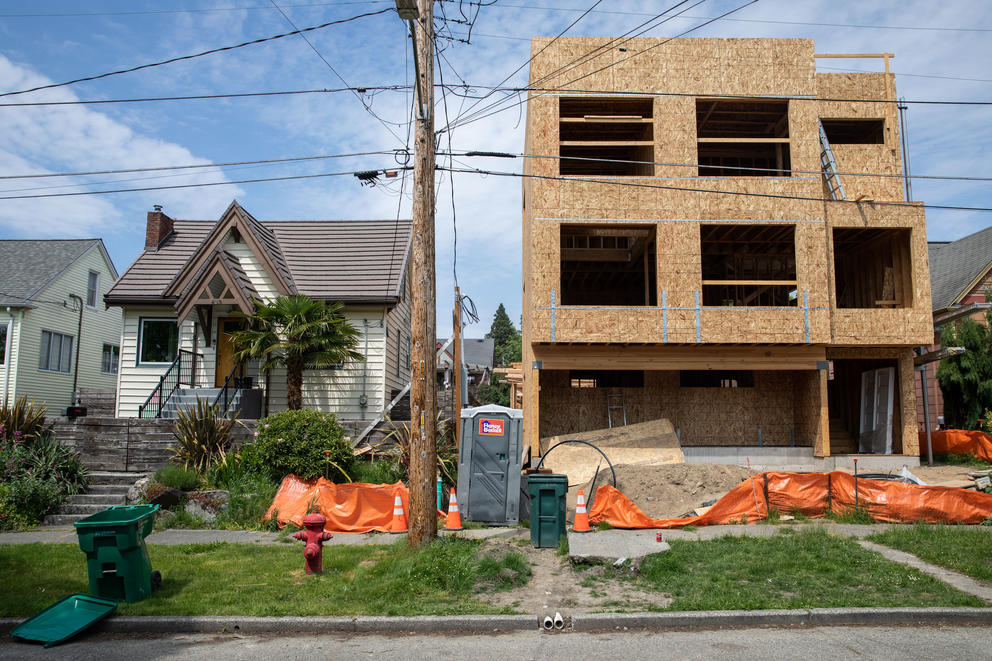Legislators called last year’s session “the year of housing,” with Gov. Jay Inslee signing at least 10 housing bills into law. But Democrats and Republicans agree there is still more work to be done as Washingtionians struggle to find affordable housing in the aftermath of the pandemic.
Hoping to create cheaper options for those seeking homeownership, Rep. Andrew Barkis, R-Olympia, introduced House Bill 1245, which would make it easier for larger residential lots to be split into lots as small as 2,000 square feet.
Barkis said in a House floor debate on Jan. 8 that because the bill would increase the supply of buildable lots used to create smaller, more affordable homes, it would make homeownership more attainable for many Washingtonians.
As housing costs increase, 88% of Washington families cannot afford to purchase a median-priced home, according to a report from the Building Industry Association of Washington, signaling a need for an influx of smaller, cheaper homes.
Although the bill passed the House on the first day of the 2024 session after its introduction last year, it failed to make it to the Senate floor calendar before the cutoff.
Another bill aimed at increasing Washington’s housing supply was House Bill 2160, which would require many large cities to allow denser housing near transit hubs like bus stops and train stations. Proponents say developing housing in these areas would bolster density in walkable neighborhoods close to public transportation.
“Currently, we’re 150,000-250,000 units short of meeting our housing needs,” said prime sponsor Julia Reed, D-Seattle, in a press release. “This is an easy way to increase that supply while reducing sprawl.”
The bill also required that 10 percent of all residential units in buildings near transit hubs be designated as affordable housing for at least 50 years, with some exceptions.
Although the bill passed out of the House on Feb. 13, it did not make it out of the Senate Ways and Means Committee.
House Bill 2270 proposed the creation of a Washington State Department of Housing.
Currently, multiple state departments are involved in housing, including the departments of Health, Commerce and Revenue. The creation of a new state agency would put these efforts under the same umbrella, which proponents argue would create a more coordinated and efficient approach.
“With a new department focused solely on housing and homelessness … we will go from a broad patchwork to a one-stop shop,” said prime sponsor Rep. Melanie Morgan, D-Spanaway, in a Housing Committee public hearing in late January.
The bill directed the Office of Financial Management to help facilitate the transition of existing programs into a new state agency, and identify gaps in current housing programs.
The bill passed the House, but died after no action was taken in the Senate Ways and Means Committee.
One rent stability bill introduced this year was House Bill 2425, which proposed creating a rental support program for low-income households.
Using funding from a 0.5% sales tax on new residential construction, recipients would pay rent equal to 30% of their household income, with marginalized communities, seniors, single parents and veterans given priority. The bill did not make it out of the Housing Committee and subsequently died.
In another move to promote rent stability, Rep. Emily Alvarado, D-West Seattle, introduced House Bill 2114 which would limit rent increases to 7% in any twelve-month period, as well as prohibiting rent and fee increases during the first year of tenancy. The bill would also allow tenants to terminate their rental agreement, after providing a written notice, if their landlord violated the 7% cap.
Over 100,000 Washingtonians in 2023 said their monthly rent increased more than $500 within this past year, according to data from the U.S. Census Bureau, prompting Alvarado to introduce HB 2114.
“Rent increases are a driving factor behind evictions, the rise in homelessness and displacement that's devastating our communities,” Alvarado said at a Jan. 11 House housing committee public hearing.
The bill also proposed limiting late fees to no more than 1.5% of a tenant’s monthly rent, as well as putting limits on security deposits and move-in fees, among other tenant protections.
The bill passed the House, but the Senate Ways and Means Committee took no action.
Alvarado said Washington has made strong efforts in the past two years to increase the supply of housing in Washington through bills addressing restrictive zoning, permitting barriers and middle housing density.
However some legislators say these efforts are just one piece of the puzzle. Rep. Strom Peterson, chair of the House Housing Committee, said he had hoped to pass more stability and affordability bills this year.
“We have not yet delivered on those other two key pieces,” Alvarado said. “People can’t wait for supply alone … lower-income and middle-income people can’t wait for housing to someday in the future to become affordable.”
The housing bills that passed
Among the few housing bills that passed this year is House Bill 1892, which will establish the Workforce Housing Accelerator Revolving Loan Fund Program in assisting with the development of low-income housing.
In an effort to bolster the supply of middle housing, the legislature also passed Senate Bill 5792 to incentivize the development of condos, as well as House Bill 2071 to amend the state building code to make it easier to develop middle and passive housing.
In a move to build a robust supply of affordable homes, Rep. Mia Gregerson, D-SeaTac, introduced House Bill 1998, which has now passed both Houses. The bill works to promote co-living housing, housing with rentable units and communal facilities, by removing current regulatory barriers and prohibiting cities and counties from imposing further restrictions. Proponents say this bill will provide solution to the state’s housing crisis by providing more affordable options.
A bill to amend parking requirements for residential housing development has passed both houses. Proponents say that current parking requirements add thousands of dollars to the development of housing, and devote space to cars that could instead be used to house people. Senate Bill 6015, proposed by Sen. Sharon Shewmake, D-Bellingham, would scale back some of these requirements, which proponents say will create more affordable and denser housing.
While some legislators have expressed their disappointment that key legislation died this year, with more recognition of a housing crisis in Washington, lawmakers hope to deliver for Washingtonians next year.
“People’s rents are going up, they’re making impossible choices, they’re facing homelessness, and it's our responsibility to act,” Alvarado said.
This story has been updated to add a few more bills.




